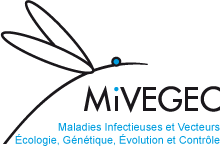MIVEGEC

The novel combination of themes studied by the MIVEGEC place it at the interface of multiple disciplines; Public Health and Environment, Biology and Medicine, Ecology and Evolution, with applications to the control of infectious disease and their vectors, managing biodiversity and ecosystem functioning.
Theoretical and experimental research is conducted at the laboratory, in shared research platforms, and in the many field sites of the group. This complementarity in the skills and expertise the MIVEGEC harbours covers a broad spectrum from core fundamental research in biology, ecology and evolution, to the development of applied tools and strategies to fight infectious diseases and control their vectors.
Theoretical and experimental research is conducted at the laboratory, in shared research platforms, and in the many field sites of the group. This complementarity in the skills and expertise the MIVEGEC harbours covers a broad spectrum from core fundamental research in biology, ecology and evolution, to the development of applied tools and strategies to fight infectious diseases and control their vectors.
Aims of Mivegec approach:
- Descriptive: to allow the acquisition and storage of high quality data collected in the laboratory, from shared research platforms, or the field, while benefiting from the presence of personnel based in countries where diseases are endemic and strong collaboration with the national institutes that host them;
- Explanatory: by the detailed study of molecular, genetic and epigenetic mechanisms, and by explicitly accounting for population dynamics and environmental, biotic, abiotic, but also socio-economical factors, in order to explore the intrinsic and extrinsic determinants of epidemiological profiles and/or phenotypes of interest detected in the field or in the laboratory;
- Predictive: by applying theory and modelling to understand the mechanisms studied and extrapolating them in time and space, to allow the emergence of new paradigms and tools to monitor and control infectious diseases and their potential vectors.
- Descriptive: to allow the acquisition and storage of high quality data collected in the laboratory, from shared research platforms, or the field, while benefiting from the presence of personnel based in countries where diseases are endemic and strong collaboration with the national institutes that host them;
- Explanatory: by the detailed study of molecular, genetic and epigenetic mechanisms, and by explicitly accounting for population dynamics and environmental, biotic, abiotic, but also socio-economical factors, in order to explore the intrinsic and extrinsic determinants of epidemiological profiles and/or phenotypes of interest detected in the field or in the laboratory;
- Predictive: by applying theory and modelling to understand the mechanisms studied and extrapolating them in time and space, to allow the emergence of new paradigms and tools to monitor and control infectious diseases and their potential vectors.
The aims of the group MIVEGEC are to develop integrative and transdisciplinary research to the mechanisms that maintain, amplify and transmit pathogenic agents, along with their genetic and epigenetic determinants, in order to better understand how these systems evolve and to improve their control.
Direction : Frédéric SIMARD


